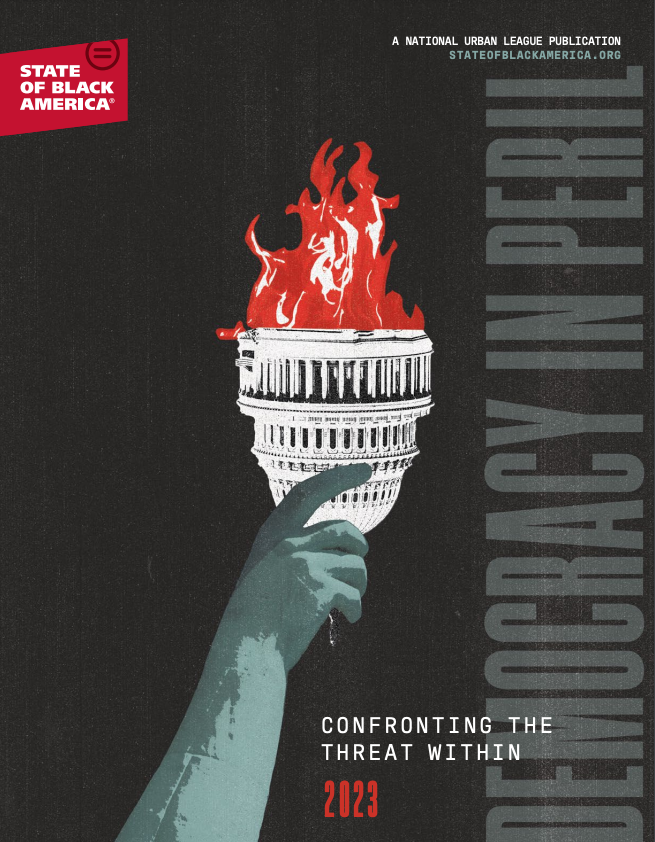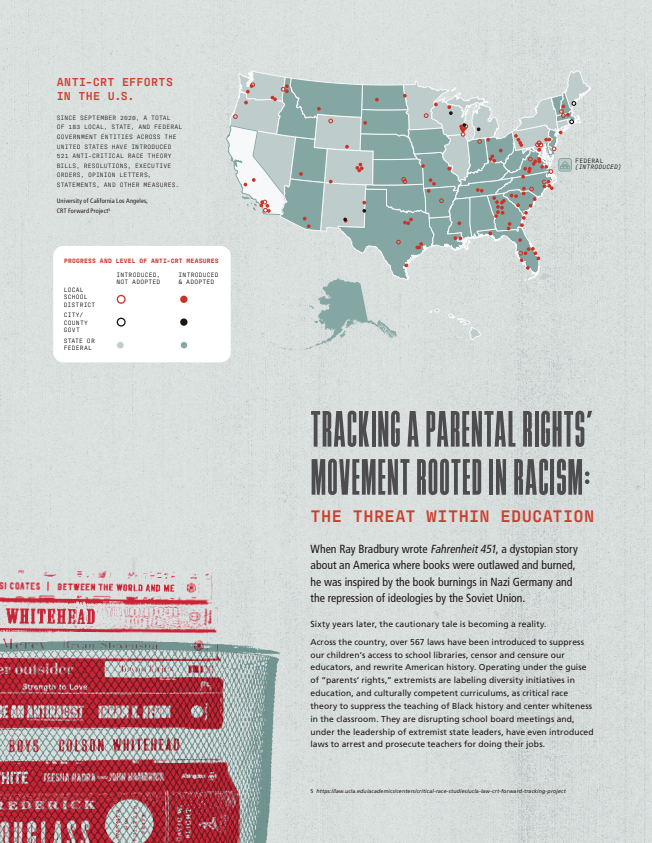Do you think parents should have a say in their children’s education, that kids shouldn’t be judged according to the color of their skin, that parents should know if their children say they identify as transgender, or that books with explicit sexual images should be removed from school libraries?
If so, you represent a threat to civil rights tracing back to the “Uptown Klans” of white Southerners trying to maintain segregation after the Supreme Court’s landmark 1954 ruling in Brown v. Board of Education, according to a researcher with the Southern Poverty Law Center writing for the National Urban League.
“State of Black America,” an annual report from the National Urban League released last week, purports to define and combat the threats facing the rights and lives of black Americans. It cites statistics about the rise in hate crimes and a few violent attacks by white supremacists, such as the horrific May 2022 shooting in Buffalo, New York, and then pivots to attack conservative politics. The report warns about “far-right extremists advocating for the erasure of our civil liberties.”
What kind of attacks are black Americans facing when it comes to their “civil liberties?” Restrictions on critical race theory, an “assault on a woman’s right to choose,” “restriction of the ballot box” and a “‘parental rights’ movement rooted in racism,” according to the report.

Citing Ray Bradbury’s 1953 dystopian novel “Fahrenheit 451,” which focuses on book burnings, the executive summary of the National Urban League report warns that “the cautionary tale is becoming a reality.”
“Operating under the guise of ‘parents’ rights,’ extremists are labeling diversity initiatives in education, and culturally competent curriculums, as critical race theory to suppress the teaching of Black history and center whiteness in the classroom,” the report states.

Critical race theory involves analyzing American institutions to find “systemic racism,” and it encourages its proponents to reexamine every aspect of life through a race-based lens that assumes white people are oppressors and black people are oppressed. Although supporters claim critical race theory is merely a legal or graduate theory, many teachers apply this lens in the classroom, infuriating parents of all races.
To compile its report, the National Urban League teamed up with the Southern Poverty Law Center, a far-left legal nonprofit known for its Cayman Island accounts and its branding of mainstream conservative and Christian organizations as “hate groups,” placing them on a map with the Ku Klux Klan. The National Urban League also enlisted the Anti-Defamation League and the University of California, Los Angeles.
Maya Henson Carey, a research analyst at the SPLC, zeroes in on “The Wrongs of the ‘Parental Rights’ Movement” in an essay that forms part of the report.
Carey recalls the aftermath of the 1954 Supreme Court ruling, tying the modern parental rights movement to the “rallying cry for parental rights” at that time, centered in “a massive resistance countermovement that birthed such groups as white Citizens’ Councils or ‘Uptown Klans,’ comprised mostly of middle- to upper-class white Southerners seeking to preserve their segregationist way of life.”
“Today, groups like Moms for Liberty, Parents Defending Education, and Parents Against CRT work diligently with politicians, right-wing celebrities, and extremist groups to spread their messages of hate, lobbying for anti-CRT and anti-LGBTQ legislation and making sweeping changes by influencing school boards to fire superintendents, constrain diverse curricula and ban books,” Carey writes.
She condemns these activists for supporting “oppression” and singles out Florida Gov. Ron DeSantis’ HB 1557, a law championing parental rights in education that critics condemned as the “Don’t Say Gay” bill. Contrary to critics’ framing, the Republican governor’s law does not prohibit the word “gay” but bars classroom instruction—not casual discussion—on “sexual orientation” or “gender identity” with children in third grade or younger.
Carey also condemns “book bans,” citing a report from PEN America claiming that schools across the country banned 1,145 unique book titles by 874 different authors during the 2021-2022 school year. The PEN America report notes that the three most targeted books include “Gender Queer: A Memoir” by Maia Kobabe, “All Boys Aren’t Blue” by George M. Johnson, and “Lawn Boy” by Jonathan Evison.
Parents don’t oppose these books due to racism or animus against those who identify as LGBT—they raised concerns about sexually explicit images and passages in these books. “Gender Queer,” for example, contains pictures of sexual acts between a boy and a man. “Lawn Boy” contains long sections in which a boy reminisces about explicit experiences he had at 10 years old. “All Boys Aren’t Blue” contains sexually explicit passages.
Carey doesn’t address or acknowledge parents’ real concerns about these books. Instead, she notes that “most of these books either pertained to characters of color or LGBTQ characters and themes. Similarly, books about race, racism, civil rights, activism, and stories with religious minorities were among the favorites targeted for banning.”
Nor does Carey note that the books aren’t exactly getting thrown on a pyre—parents want the books out of school libraries and classrooms, but these volumes are still easily accessible at public libraries, in bookshops, and with a single click on Amazon.com.
Carey also frames opposition to critical race theory—a political ideology—as a “history-denying” agenda pushed by “reactionary anti-student inclusion groups.”
Laws targeting critical race theory such as Georgia’s HB 1084 (which Gov. Brian Kemp, a Republican, signed in April 2022) prohibit school systems from using a curriculum promoting “divisive concepts” such as claims that “one race is inherently superior to another race.” Other divisive concepts include “The United States of America is fundamentally racist,” and that “meritocracy or traits such as a hard work ethic are racist or were created by individuals of a particular race to oppress individuals of another race.”
The Georgia law aims to enforce existing civil rights law against discrimination, its sponsor said.
Twisting issues like this to demonize conservatives is nothing new for the SPLC. As I wrote in my book “Making Hate Pay: The Corruption of the Southern Poverty Law Center,” the SPLC now uses the program it launched to monitor the Ku Klux Klan to demonize mainstream conservative and Christian organizations as “hate groups,” putting them on a map with Klan chapters. Carey echoes this strategy in her closing line for the National Urban League report, tying the article back to her point about the “Uptown Klans.”
“Our country, communities, and schools are again under attack by the descendants of hate groups of decades past, spewing the same hateful messages dressed up with fresh political rhetoric,” she writes.
Somehow, objecting to pornographic images in a school library book amounts to “hate.” Balking at the idea of telling little children that America is institutionally racist amounts to donning a Klan hood.
Perhaps this and other reports on the state of black America should focus on the actual issues facing black Americans, rather than twisting the truth to demonize conservatives.
Have an opinion about this article? To sound off, please email letters@DailySignal.com and we’ll consider publishing your edited remarks in our regular “We Hear You” feature. Remember to include the url or headline of the article plus your name and town and/or state.
The post Opposing Porn in School Makes You Part of New ‘Uptown Klan,’ SPLC Researcher Says appeared first on The Daily Signal.


0 Commentaires